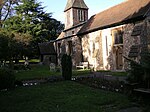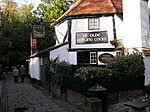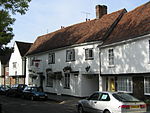St Columba's College, St Albans
1939 establishments in EnglandAll pages needing cleanupBoys' schools in HertfordshireEducational institutions established in 1939Member schools of the Headmasters' and Headmistresses' Conference ... and 4 more
Private schools in HertfordshireRoman Catholic private schools in the Archdiocese of WestminsterSchools in St AlbansUse British English from May 2015
St Columba's College is a co-educational 4–18 private, Catholic day school and sixth form in St Albans, Hertfordshire, England. It was founded in 1939 by Phillip O’Neil and taken over by the Brothers of the Sacred Heart in 1955. It is a member of the Headmasters' and Headmistresses' Conference. Facing St Albans Cathedral across the River Ver, the college is built around two historic houses, Watling House and Iona House.
Excerpt from the Wikipedia article St Columba's College, St Albans (License: CC BY-SA 3.0, Authors).St Columba's College, St Albans
King Harry Lane, St Albans St Stephens
Geographical coordinates (GPS) Address Nearby Places Show on map
Geographical coordinates (GPS)
| Latitude | Longitude |
|---|---|
| N 51.743611111111 ° | E -0.35 ° |
Address
St Columba's College
King Harry Lane
AL3 4AW St Albans, St Stephens
England, United Kingdom
Open on Google Maps







